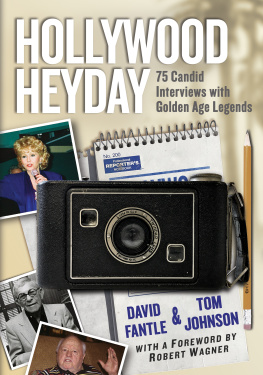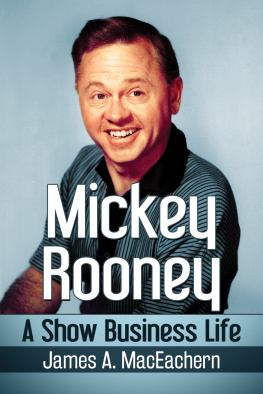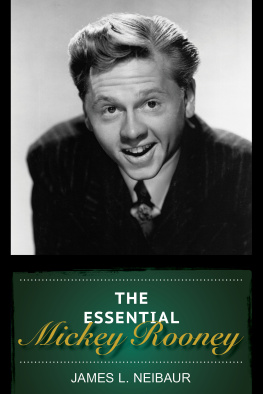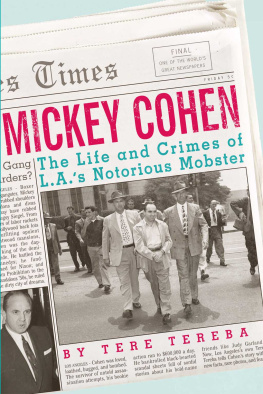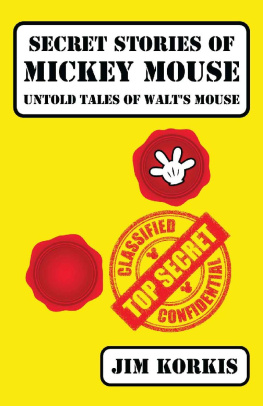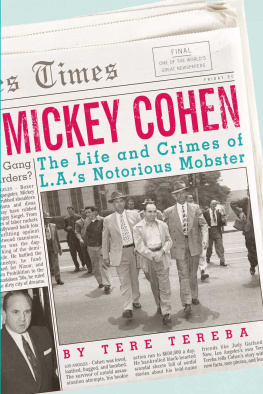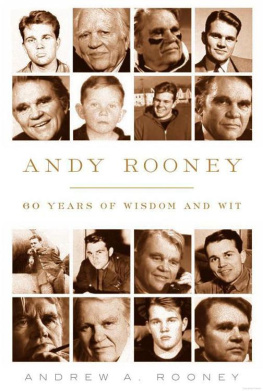Thank you for downloading this Gallery Books eBook.
Join our mailing list and get updates on new releases, deals, bonus content and other great books from Gallery Books and Simon & Schuster.
C LICK H ERE T O S IGN U P
or visit us online to sign up at
eBookNews.SimonandSchuster.com
We hope you enjoyed reading this Gallery Books eBook.
Join our mailing list and get updates on new releases, deals, bonus content and other great books from Gallery Books and Simon & Schuster.
C LICK H ERE T O S IGN U P
or visit us online to sign up at
eBookNews.SimonandSchuster.com
Contents
T O THE MEMORIES OF M ICKEY R OONEY , R OBIN W ILLIAMS, AND J OAN R IVERS
We all die, but comedians, through their fleeting moments of glory, fearlessly seeking that one laugh, live forever.
They take us where we need to go even if we dont want to go there.
I was a fourteen-year-old boy for thirty years.
M ICKEY R OONEY
I dont want to hurt him, poor darling. He aint got a fucking cent. Hes been raked over the coals for millions by those goddamn wives he kept getting married to after me. What is it they say? The fucking you get for the fucking you got?
A VA G ARDNER
Foreword by Roger Kahn
M ickey Rooney was his own sort of enigma, reinventing himself as the situation demanded. I should know, because I was one of his first biographers. Now Bill Birnes and Rick Lertzman have taken on this task in the wake of Mickeys passing, in a thorough look at not only the life of Mickey Rooney, but at his times as well.
My introduction to Mickey was precipitated by a series of profiles I had written. One of them, a very popular article for The Saturday Evening Post , was based on a day with Robert Frost. My editors asked me, What would you like to do next? I said that Id like to do one on Sean OCasey, but they told me that they didnt believe too many people in Kansas City would care for an article on a left-wing Irish playwright. They asked, How about Jackie Cooper? So I went to Jackie Cooper, who said he would cooperate only if he were part of the byline; we gave it to him. The piece was called, Unfortunately, I Was Rich. I didnt love it because his lawyer gutted anything that had to do with Jackies issues with his biological father, which was sort of a key to his strange life, but other people liked it. It convinced the publisher that if I could work with Cooper, I could work with Mickey Rooney.
There was a pretty good pot of money involvedfor the 1960s. It was seventy-five thousand dollars for Rooney and me to split. I thought this fellow had an interesting life; he started working when he was barely two years old. I guess his first couple of years he just lay around the house. I met Mickey in an office building at the corner of Hollywood and Vine, with his lawyer, Dermot Long. Mickey came bouncing into the office and announced that the book will be about a loud little guy who doesnt want to be loud. Its a story of a guy who thinks well twice a month. If I had gone slower, if the drinks had been lighter, and if the girls had been gentler, this would have been a much nicer story.
I liked his idea, and it seemed like a pretty good opening. We went on a bit. The publisher said that if I thought I could do it, I needed to write a presentation for a forty-minute meeting. I did, and they approved itbut then Rooney disappeared. Our first meeting, we went to Santa Anita Park racetrack and he said, Ill mark your card. I thought he knew a great deal about the horses, but as it turned out, he didnt. As soon as we got to the track, hed asked, Could you let me have six hundred dollars? Ive got to settle with a guy in the next box. So I gave him six hundred dollars. And he said, Dermot will give it back to you. Dermot handles the money. So I saw Dermot a couple of days later and asked for my six hundred dollars back. And he said, I cant do that. Im operating under the thumb of the IRS, and they had to approve every check I write. And they wont approve a check to pay off a debt at the racetrack. Dermot, who always tried to be decent, said he could get it from one of Mickeys performances in Vegas and write it off as an expense. So that was our beginning.
At the track, Mickey had an intricate system that didnt work very well. When he came to pick me up, he said he had a small car. I thought he meant it was a Corvette. He was actually driving a Corvair. A small car. From my place, he drove straight to a gas station to fill up. Immediately the attendant recognized him. He said, Mickey Rooney, wow! Mickey chuckled and he said, A dollars worth please. He turned to me and said, Its all these little cars will hold, No. It was all he could afford. So we had a miscellaneous kind of a day.
W HEN WE STARTED THE interview, I asked, Will a tape recorder bother you? He said no. Actually, it was the whole project that bothered him. Once he had Dermot Long deposit the publishers check, he disappeared. Every day, while he was physically in Encino, I would call Dermot whod say, He cant see you today; he has to visit his in-laws, or He has to audition for a part, or He cant see you today; he has a meeting at his church. After two or three weeks of this, I called my agent and said forget it. My agent said, You cant. The publisher really wants the book. And if you back out now, youre looking at litigation, and youll be in three-way litigation with the publisher and Rooney, and it will be a mess. And I figured out that it would be a mess, so I continued my efforts, got nowhere, stayed in Hollywood at the Chateau Marmont, and did some other pieces, like one on director Stanley Kramer, who was an interesting fellow, and it made for a good piece. I did one on Joan Baez, who was obnoxious, and it didnt make for a good piece. And then I said again wed have to drop the Rooney book, but again I was warned of the litigation.
Then I got to see him for bits and pieces of time. But there was never any serious talk. If there had been, I could have wrapped it up in three or four weeks. Instead, I had little smidgens of things. I was writing this under the threat of litigation, and saying to myself, How did I get into this? and thinking I was going to have to fire my agent, and having all sorts of diffuse thoughts occupy my head. So I wrote a draft of the first chapter. The Saturday Evening Post liked it very much and offered twenty-five thousand dollars. At the time, Rooney was married to Barbara Thomason, his fifth wife. When I told Mickey about the fee, Barbara said, I heard Cary Grant got a hundred and fifty thousand from The Saturday Evening Post . I didnt say, Mickey isnt Cary Grant, but I tried to say, Well, this is what the market is offering. Mickey got very angry then and said, Fuck em. They cant have it.
It fell upon me to tell The Saturday Evening Post that hed said no. They werent happy and thought that the twenty-five grand was a good offer, as did I. I kept kind of slogging along, and the publisher kept waiting. After a bit, I finally pieced together something, which was at best mediocre, because I was getting no cooperation. So I turned it in and I thought, good, now Im done. But the publisher wanted more.
So I went to a lawyer, a very good literary lawyer named Charles Rembar. He said, From what youre telling me, youre going to have to sue these bastards. Rembar said that it didnt matter what you sued for; ultimately the judge decided what youd get. Rembar said, Do you want to sue for a million? I said, Sure. So we sued for a million, and it had the effect that Rembar wanted, which was to get the attention of Rooneys lawyer and Rooney. So then I went back to Rooney and got some more material, but I still didnt have enough. The publisher was still pressing. Rembar told Rooneys lawyer that I needed Rooney for two days, full time, with no distractions, no phones, no nothing. And if I had those two days, I could finish the research for the book. So I went out there, and Rooney asked, Have you written anything? and I said, Yes. And he said, Let me read it. So he started reading the draft aloud. I had used the word faade , and he read it as fo-cade. It turned out that he couldnt really read very well. Everything was through the ear.
Next page

